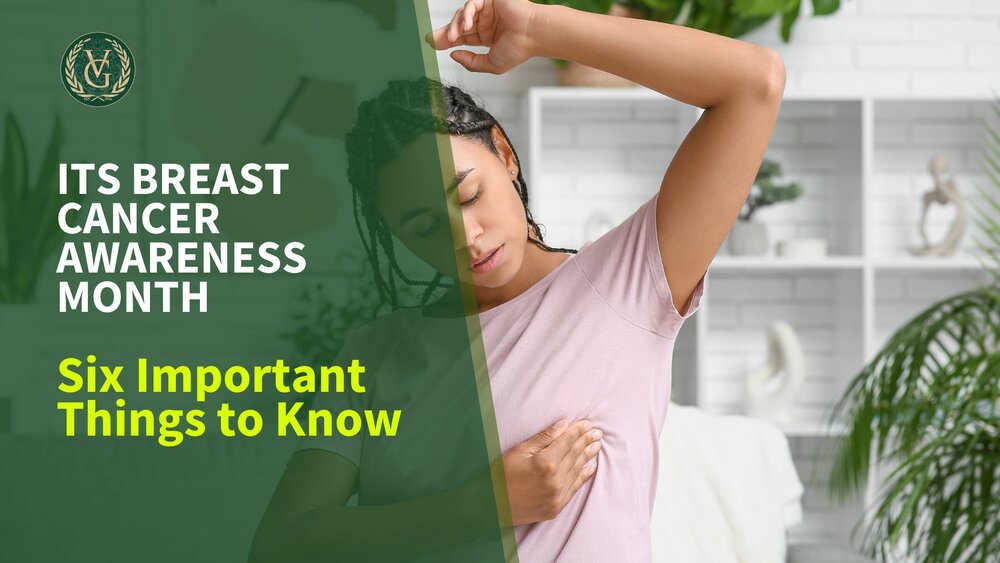It’s Breast Cancer Awareness Month: Six Important Things to Know
Breast Cancer Awareness Month serves as a reminder that knowledge and action can save lives and change outcomes.
Since 1985, the U.S. has recognized October as National Breast Cancer Awareness Month. It is a time devoted to educating people about breast cancer, including the importance of early detection and access to timely, high-quality care. Known for its pink theme color, the month features many campaigns and programs conducted by groups ranging from breast cancer advocacy organizations to local community groups and major retailers.
Please read on as we share some eye-opening statistics about this disease, along with six important facts everyone should know.
U.S. breast cancer statistics
People of every country, race, ethnic group, and income level are affected by breast cancer. In the U.S., the percentage of women diagnosed with breast cancer has been rising for the past several decades.
- One in eight women will be diagnosed with breast cancer in their lifetime, making it the most common cancer in women, aside from skin cancers.
- The two most common risk factors for developing breast cancer are being born female and getting older.
- In 2024, an estimated 310,720 new cases of invasive breast cancer will be diagnosed in women, and approximately 42,250 women are expected to die from the disease
- While the prevalence of breast cancer is high in the United States, the survival rate is also high — 90% of patients beat the cancer.
Get the facts about breast cancer
1. Start by knowing your risk.
Have a consultation with your physician to discuss your family history and assess your risk of breast cancer. It could also include genetic testing if recommended, along with a detailed full family history evaluation. Based on your risk level and their age, you and your doctor can then create a screening plan moving forward.
2. Earlier diagnosis means better prognosis.
Thanks to greater awareness and more advanced exams and screenings, breast cancer can be caught at a very early stage. For that reason, the majority of patients with breast cancer have an excellent prognosis. For those at average risk, its’s important to get a mammogram every year starting at age 40. If you have any signs of breast cancer, finding it early and treating it early may save your life.
3. For people at high risk, screenings should begin at age 30.
Those with a high risk of breast cancer should be screened with a breast MRI and a mammogram every year, typically beginning at age 30. This includes people who:
- Have a personal history of breast cancer.
- Have a known BRCA1 or BRCA2 gene mutation (through a genetic test).
- Have a first-degree relative (parent, sibling, or child) with a BRCA1 or BRCA2 gene mutation and have not had genetic testing themselves.
- Had radiation therapy to the chest when they were between 10 and 30 years old.
Additionally, black women are 40% more likely to die of breast cancer than white women and often get deadly cancers at younger ages. Experts recommend getting screened earlier than age 40.
4. Learn the symptoms.
Familiarizing yourself with the common signs of breast cancer can aid in early detection. These may include changes in breast size or shape, lumps or masses, changes in skin texture (such as dimpling), or unusual discharge from the nipple. If you notice any of these symptoms, consult your physician promptly for evaluation.
5. There are many new procedures available to treat breast cancer.
Today, many options exist other than the full removal of the breast(s). Newer breast conserving options include partial mastectomy, lumpectomy (which removes the cancer while sparing as much of the healthy breast and breast tissue as possible), nipple-sparing mastectomy, and skin-sparing mastectomy, as well as breast reconstruction procedures that can occur at the same time the breast(s) are removed. Researchers are also developing new medications with very promising results. For instance, certain estrogen-blocking drugs, which are typically used to help treat breast cancer, might also help prevent it.
6. You can lower your risk of breast cancer.
Educating yourself about how lifestyle choices impact your health can empower you to make informed decisions and foster a proactive approach to breast cancer prevention:
- Maintain a healthy weight: Weight gain as an adult is linked with a higher rate of breast cancer.
- Exercise regularly: Exercise helps maintain a healthy weight, balances hormone levels, and boosts the immune system.
- Reduce alcohol consumption: According to the American Cancer Society, women should have no more than one alcoholic drink per day, and it is best not to drink alcohol at all.
As we observe Breast Cancer Awareness Month, let’s honor and support those affected by this disease. Whether it's through education, early detection, or compassionate care, every action counts. If you or a loved one needs support, please reach out to us—we’re here for you.
About Vaughn Greene Funeral Services: For more than 25 years, Vaughn Greene Funeral Services has been providing a ministry of care to Baltimore’s African American community. As a leading local, minority- and family-owned provider, we promise to provide our highest level of service and respect to families who entrust us to honor their loved ones. For more information about our funeral, cremation, memorial, repast, and grief counseling services, please call us at 410.655.0015 or visit us online at https://vaughncgreene.com/.








Comments